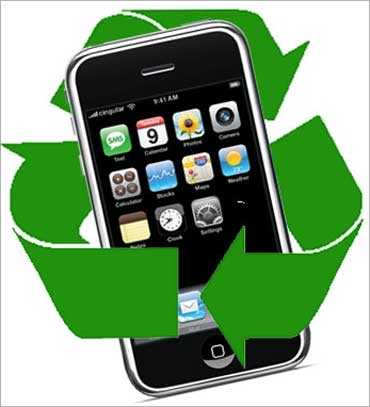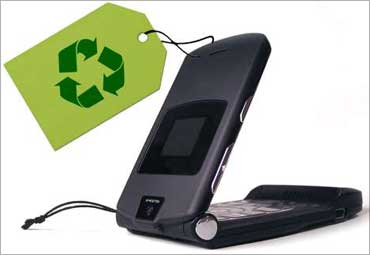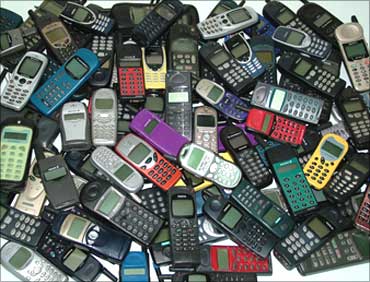Manisha Pande in New Delhi
Mobile phone and PC makers gobble up three per cent of the world's entire gold and silver supply each year, not to mention 13 per cent of palladium, 15 per cent of cobalt, and plenty of copper, steel, nickel and aluminum.
Do you plan to discard your mobile phone or exchange it for a new one? Then consider this: Old mobile phones constitute 1,700 tonnes of the 50,000 tonnes of e-waste generated in India each year and, according to a UN report released early this year, e-waste from mobile phones is set to rise 18 times by 2020.
E-waste, or electronic waste, implies discarded computers, mobiles, refrigerators or any other electronic appliance at the end of its life. With growing consumerism, discarding e-waste has become a big challenge in the country.
This has spawned a relatively new sector: Organised recycling. As of now, 16 players have sprung into action by re-cycling mobile phones, which also contain precious metals like gold, silver and platinum as well as other metals like copper.
Mobile phone and PC makers gobble up three per cent of the world's entire gold and silver supply each year, not to mention 13 per cent of palladium, 15 per cent of cobalt, and plenty of copper, steel, nickel and aluminum.
Faisal Faraz, marketing manager for e-waste recycling company Greenscape, says, "Almost 90 per cent of e-waste is being recycled by the unorganised sector, which includes small scale garbage collectors. The process they use for extracting precious metals is not only harmful, but also results in the loss of almost 75 per cent of the precious metals."
He reasons that a licensed re-cycler can extract metal waste in an eco-friendly way.
...
Time for mobile users to ring in recycling
While all parts of a gadget are re-cycled locally, printed circuit boards (PCBs) of mobile phones are exported abroad to smelting companies for metal extraction. Last year alone, Greenscape exported 100 tonnes of PCBs from e-waste (1.3 tonnes from mobile phones) to smelting companies, like Umicore, in Belgium.
Besides precious metals, an average mobile phone contains poisonous substances like lead and mercury, which can pose serious environmental and health hazards if not disposed properly.
The Indian Cellular Association, which represents the mobile industry, is said to be working on e-waste guidelines. Pankaj Mahendroo, president, ICA, says, "Except for a few vendors there is no massive recycling initiative yet."
This is the situation in a country where annual mobile sales are forecasted to reach 138.6 million in 2010 - an increase of 18.5 per cent over last year's sales of 117 million units, according to Gartner data.
"Cellular phone penetration in India stood at 45 per cent in 2009 and, now, the market is entering a second growth phase, with replacement sales increasing from 45 per cent in 2009 to 50 per cent of total sales in 2010," informs Anshul Gupta, principal research analyst at Gartner.
...
Time for mobile users to ring in recycling
Major handset makers may have announced a take-back policy that collect old handsets and give them to authorised re-cyclers, but the exercise is clearly lacking momentum as most users are still unaware of such schemes.
According to a Nokia study, awareness in India about recycling was the lowest among all countries surveyed at 17 per cent and 84 per cent of Indians didn't think about recycling their unwanted phones.
A small beginning was made by Nokia with 'Planet Ke Rakhwaale' - a take-back and recycling campaign launched early this year. Under the programme, Nokia encourages consumers to drop their unused mobiles and chargers, irrespective of the brand, into 1,350 recycling bins placed at Nokia Care Centres.
As of April, Nokia says it has collected more than 16 tonnes - or more than 500,000 phones and accessories.
Samsung, too, informs that it has an on-going recycling initiative across 216 centres.
"We have tied up with a government-authorised recycling agency for recycling old mobiles. The response to this initiative has been encouraging and we plan to shortly extend this take-back programme to our consumer electronics products as well," says Ranjit Yadav, director, Mobile & IT, Samsung India, without detailing how many mobile phones the company has recycled so far.
Sony Ericsson, while claiming it has a take-back policy for old handsets, remained uncommunicative on details.





article